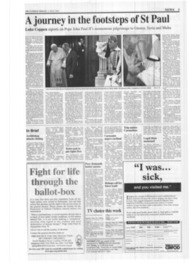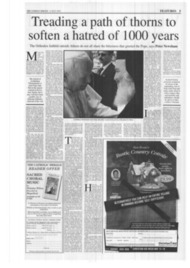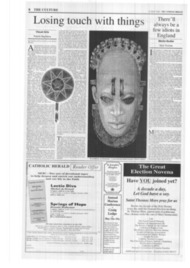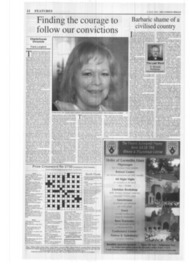Page 3, 11th May 2001
Page 3
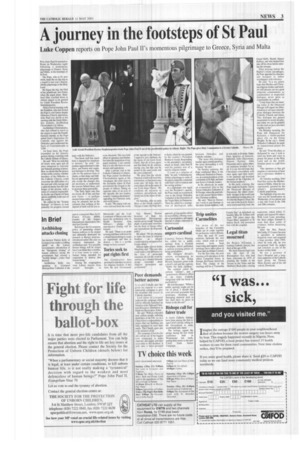
Report an error
Noticed an error on this page?If you've noticed an error in this article please click here to report it.
Tags
Share
Related articles
Middle East
Pope Embarks On Pilgrimage In Footsteps Of St Paul The...
Pope's Visit Heals Historic Wounds
Pope To Visit Israel In Year Woo
John Paul For Mecca?
A journey in the footsteps of St Paul
Luke Coppen reports on Pope John Paul II's momentous pilgrimage to Greece, Syria and Malta POPE JOHN Paul II returned to Rome on Wednesday night following a momentous pilgrimage to Greece, Syria and Malta, in the footsteps of St Paul.
Thc Pupe, who is 81 next week, made the six-day trip as a sequel to last year's historic Jubilee pilgrimage to the Holy Land.
He began the trip, the 93rd of his pontificate, last Friday when the papal plane, Shepherd One, touched down at Athens airport to be greeted by Greek President Kostas Stephanopoulos.
After a formal meeting with the President, who had invited the Pope to visit Greece despite Orthodox Church opposition, John Paul was driven to his meeting with the Greek Orthodox primate, Archbishop Christodoulos of Athens.
Archbishop Christodoulos, who had refused to travel to the airport to meet the Pontiff, listened intently as the Pope asked God's forgiveness for Catholic sins against the Orthodox and condemned the Sack of Constantinople in 1204.
An hour later, the Pope expanded on his historic gesture during a meeting with the Catholic bishops of Gmece.
He said: "How we wish that all hearts were open and all arms outspread to welcome our fraternal greeting of peace. How we dream that the pastors of this noble country, whether members of the Orthodox or the Catholic Church, could overcome the difficulties of a the past and with courage and a spirit of charity face the challenges of the present, with a sense of common responsibility for the one Church of Christ and its credibility in the eyes of the world."
He called for the "frontier bishops" of Greece, to wait patiently for progress toward unity with the Orthodox.
"You know well that much time is required for situations to mature," he said," for prudent rapprochement to take place, and honest and continued dialogue to develop. This calls for the patience born of charity, so that clergy and faithful can appropriate and gradually accept the changes that are necessary, to understand the reasons behind them, and to promote them personally.
"The Holy Spirit asks that we revisit all of this and that new forms — or perhaps ancient forms rediscovered — may be adopted, but in the certainty that nothing of the deposit of faith will be lost or even obscured. This two-fold effort of openness and fidelity has been the inspiration of my papal ministry. I am certain that it is also the basis of your desires and aspirations.
After a private visit to the Catholic Cathedral of Athens. the Pope joined Archbishop Christodoulos again at the Areopagus, the court close to the Acropolis where St Paul proclaimed the Gospel to the people of Athens. Sitting on opposite sides of an icon of the Apostle, the two leaders issued a "common declaration" appealing for Christian unity and world peace.
It said: "We repeat with one voice and one heart the words of the Apostle to the Nations: 'I appeal to you, brethren, by the name of our Lord Jesus Christ, that all of you agree and that there be no schisms among you, but that you be united in the same mind and the same judgment'.
"We pray that the whole Christian world will heed this exhortation, so that peace may come unto 'all those who in every place call on the name of our Lord Jesus Christ'. We condemn all recourse to violence, proselytism and fanaticism in the name of religion."
On Saturday, after an early Mass at the Greek capital's Olympic Centre, the Pope flew to Syria, where he was greeted by the country's President Bashar al-Assad. Responding to the president's incendiary attack on Israel, John Paul H said his journey was of a strictly religious nature.
"I come as a pilgrim of faith," he said, "continuing my Jubilee pilgrimage to some of the places especially connected with God's self-revelation and his saving actions."
As a diplomatic row raged over the President's speech, the Pope made an ecumenical visit to the Greek Orthodox Cathedral of the Dorrnition of the Virgin Mary in Damascus. There he called for a resumption of theological talks between Orthodox and Catholic scholars.
"The more this dialogue touches upon central questions, the more demanding it will become," he said. On Sunday morning, the Pope celebrated Mass at the Abbayssin Stadium in Damascus, in commemoration of the conversion of St Paul, and later met Syria's Catholic leaders.
In the afternoon, he made an ecumenical visit to the Syrian Orthodox Cathedral of St George, where he paid tribute to the ancient Syrian Orthodox Christian tradition.
He said: "Here in Damascus 1 wish to pay homage to the entire Syrian tradition, with
its rich unity in diversity. Saints Paul, Ignatius of Antioch, Ephraem, John Chrysostom, Simeon Stylites, John Damacene and so many others are luminous teachers for us all. It is my fervent hope that Christians everywhere will once again open their hearts to the spiritual and doctrinal treasures of the Churches of the Syrian tradition."
In the early evening, the Pope made his historic visit to the Omayyad Mosque of Damascus, the oldest stonebuilt mosque in the world and the traditional resting place of St John the Baptist's head. He was met at the door by Syria's most renowned holy man, the Grand Mufti, Sheikh Ahmed Kuftaro, and who helped him take off his shoes before entering the mosque.
After praying before the Baptist's ornate sarcophagus, the Pope appealed for churches and mosques to imbue worshippers with tolerance.
He said: "It is my ardent hope that Muslim and Christian religious leaders and teachers will present our two great religious communities as communities in respectful dialogue, never more as communities in conflict.
"I truly hope that our meeting today in the Omayyad Mosque will signal our determination to advance interreligious dialogue between the Catholic Church and Islam. This dialogue has gained momentum in recent decades; and today we can be grateful for the road we have travelled together so far."
On Monday morning, the Pope left Damascus for Kuneitra, a bullet-pocked ghost city on the Golan Heights. In the city's Greek Orthodox Cathedral, he made an impassioned prayer for peace.
He said: -From this place, so disfigured by war, I wish to raise my heart and voice in prayer for peace in the Holy Land and in the world. Genuine peace is a gift from God.
"Our openness to that gift requires a conversion of heart and a conscience obedient to his Law."
On Tuesday morning, John Paul flew across the Mediterranean to Malta, where he was rapturously greeted by the island's predominantly Catholic population.
The highlight of his two-day visit was the beatification on Wednesday of two priests and a nun who lived in the 19th and 20th centuries.
blog comments powered by Disqus




